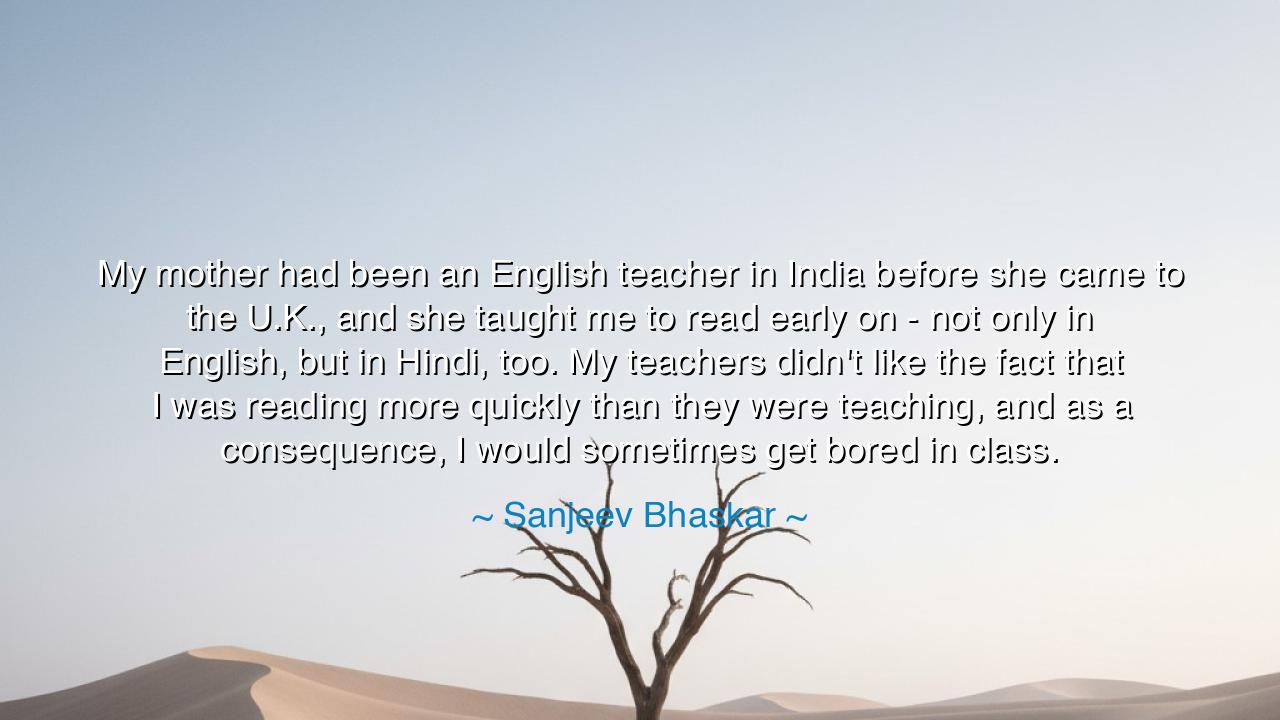
My mother had been an English teacher in India before she came
My mother had been an English teacher in India before she came to the U.K., and she taught me to read early on - not only in English, but in Hindi, too. My teachers didn't like the fact that I was reading more quickly than they were teaching, and as a consequence, I would sometimes get bored in class.






Sanjeev Bhaskar once recalled with tenderness and honesty: “My mother had been an English teacher in India before she came to the U.K., and she taught me to read early on — not only in English, but in Hindi, too. My teachers didn’t like the fact that I was reading more quickly than they were teaching, and as a consequence, I would sometimes get bored in class.” In these words, we hear not just a personal memory, but a universal truth: that learning often begins in the home, carried first by the love of a parent, and that the flame of curiosity can sometimes burn faster than the world is prepared to tend.
The origin of this story rests in the figure of the mother. Before the formal schools, before the stern classrooms of the West, there was a woman who carried the strength of two lands — India and England — and who gave her son not just words, but languages. To be taught to read early is to be given sight before one’s peers, to walk among unseen worlds of thought while others are still learning to crawl. It is both a blessing and a burden: a blessing, because it opens the soul to imagination and wisdom; a burden, because it sets the child apart, leaving him restless among slower steps.
The ancients often spoke of this paradox. Plato wrote of the philosopher who sees more deeply than his fellow citizens, yet finds himself alienated by the very vision that elevates him. So it was with Bhaskar: the teachers of his childhood, bound by the pace of their method, could not embrace a child whose mind leapt beyond their rhythm. Instead of fanning the flame, they feared it. And thus boredom crept in, that silent danger of the gifted: the spirit unchallenged, the mind left restless.
History offers a striking example. The young John Stuart Mill, philosopher and reformer, was taught by his father before he ever entered a classroom. By the age of three he read Greek, by eight he devoured Plato’s dialogues. In school, like Bhaskar, he often surpassed his teachers, who could neither match nor understand his pace. Such children often live between worlds: too advanced for their age, yet still too young to guide themselves. They rely on the rare teacher or parent who dares to nurture, not restrain, their hunger.
Yet this story is not only about brilliance; it is also about identity. Bhaskar’s mother did not teach him only English, the language of empire and opportunity, but also Hindi, the tongue of his heritage. In doing so, she preserved not just knowledge, but memory, belonging, and roots. The child who reads in two languages does not merely read faster; he sees the world with two sets of eyes, two rhythms of thought, two mirrors of truth. Such a gift prepares him to navigate both the foreign and the familiar, the land of his birth and the land of his destiny.
What lesson, then, lies within this story? It is this: never fear the child who learns too quickly. Do not slow their pace to match the crowd; instead, lift the crowd to meet them, or set them on a higher road. The wise teacher does not punish curiosity, nor resent brilliance, but rejoices in it. And the wise parent, like Bhaskar’s mother, sows seeds early, so that when the world offers little, the child’s inner garden still blooms.
Practical steps emerge from this wisdom. If you are a parent, nurture curiosity in your child, even before school begins. If you are a teacher, watch for the student whose flame burns brighter, and instead of dimming it, give it more fuel — harder books, deeper questions, new challenges. And if you are a learner, never allow boredom to become your cage; seek new paths, new knowledge, new languages, just as Bhaskar did. For the world belongs not to those who wait for permission to learn, but to those who dare to read ahead.
Thus, let Bhaskar’s words resound across time: the mother who teaches, the child who hungers, the classroom that resists, and the spirit that endures. From this, we learn that education is not a prison of uniform pace, but a garden of many seeds, each sprouting in its own time and place. Honor the quick learner, guide the restless, and above all, remember that the truest teaching begins not in the classroom, but in the love of a home.






AAdministratorAdministrator
Welcome, honored guests. Please leave a comment, we will respond soon